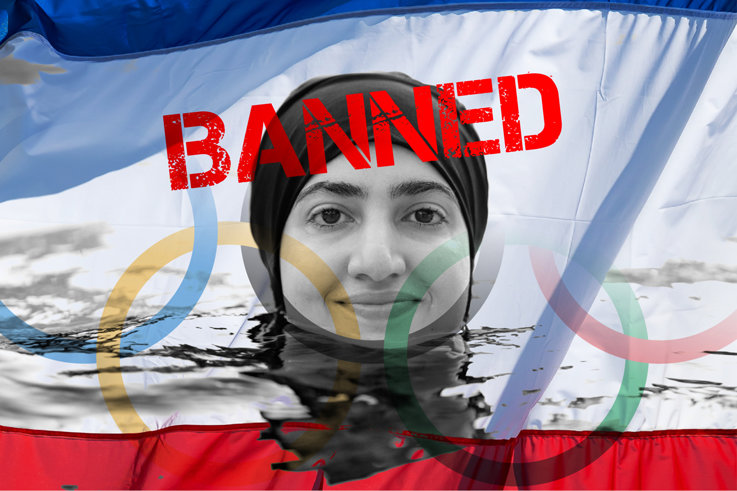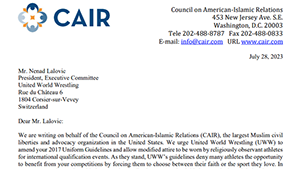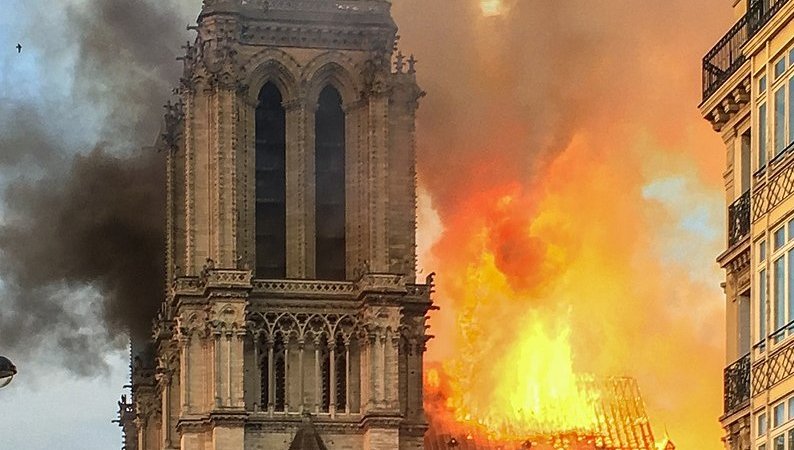
-
HOME
-
WHAT IS STANDOur Mission Our Values Our Help Contact
-
WHAT WE FIGHT FORReligious Freedom Religious Literacy Equality & Human Rights Inclusion & Respect Free Speech Responsible Journalism Corporate Accountability
-
RESOURCESExpert Studies Landmark Decisions White Papers FAQs David Miscavige Religious Freedom Resource Center Freedom of Religion & Human Rights Topic Index Priest-Penitent Privilege Islamophobia
-
HATE MONITORBiased Media Propagandists Hatemongers False Experts Hate Monitor Blog
-
NEWSROOMNews Media Watch Videos Blog
-
TAKE ACTIONCombat Hate & Discrimination Champion Freedom of Religion Demand Accountability
In Summer Olympics, All Muslim Athletes May Wear Religious Garb—Unless They’re French
The French policy of laïcité—literally, “secularism”—has recently come under fire from human rights organizations. At the center of the controversy is a recent ruling concerning the wearing of religious head garb by female Muslim athletes in the upcoming summer Olympics, beginning July 24 in Paris.

In September 2023, the International Olympic Committee, in the spirit of religious freedom and cultural expression, announced that Muslim athletes may wear a hijab without constraints. However, French Sports Minister Amelie Oudea-Castera said that French athletes are bound by the principle of laïcité—France’s complete separation of religion and state, dating back to the French Revolution—and are, therefore, forbidden from wearing their hijabs while competing.
In 2004, France banned the wearing of religious symbols in public schools. The prohibition included the hijab, yarmulkes, Sikh turbans and large Christian crosses.
The U.N. human rights office quickly responded to the ban through spokesperson Marta Hurtado, who said, “No one should impose on a woman what she needs to wear or not wear. According to international human right standards, restrictions of expressions of religions or beliefs such as attire choices are only acceptable under really specific circumstances that address legitimate concerns for public safety, public order or public health or morals.”
Laïcité first came about as a reaction to the twin dominance of the monarchy and the Catholic Church in pre-revolutionary France, an unholy marriage that kept the ordinary Frenchman under the heel of King and clergy. From the crowning of Charlemagne in 800 C.E. and the ensuing centuries, the Church garnered land and influence. It wielded enormous power over everything from education to healthcare and enjoyed a close relationship with the crown, with many nobles acceding to high positions within the Church. Once the monarchy was eliminated in 1789, the Church, as its partner, also took a hit. Its properties were nationalized, and its influence on public life reduced.
But laïcité has failed to adapt to France’s changing demographics. Now a nation of diverse religions with 10% of its population Muslim—the largest such community in Europe—France, according to human rights activists and students of history, now weaponizes laïcité to suppress religious freedom and human rights.
As Armin Langer, Assistant Professor of European Studies at the University of Florida, points out, “While laïcité was originally introduced alongside principles such as freedom and equality, as times changed, so did its meaning. Initially, laïcité meant keeping religion separate from the state. Lately, however, it is often interpreted to mean that citizens should refrain from showing their religious identities in public.”
Langer adds, “Christian traditions focus mostly on beliefs, which are private, while Islamic and Jewish traditions emphasize practices, such as wearing headscarves, that are visible. This means laïcité affects people differently, often more strictly targeting visible signs of non-Christian religion.”
In 2004, France banned the wearing of religious symbols in public schools. The prohibition included the hijab, yarmulkes, Sikh turbans and large Christian crosses. Six years later, the ban broadened to encompass all public places. The prohibitions have disproportionately affected Muslims, including schoolchildren—who are now forced to choose between their religion and their education—and professional athletes, several of whom have departed French sports teams due to untenable religious restrictions.
According to Langer, “France’s ban on religious symbols in official sports activities highlights the struggle to balance religious freedom with national values. This becomes especially complicated in the Olympics, where athletes’ individual expressions clash with their roles as representatives of their countries.”
The U.S. Commission on International Religious Freedom voiced concern over France’s pretense of religious freedom while the nation, in fact, denies that freedom to a large segment of its people. Outgoing Chair Abraham Cooper said, “In a misguided effort to promote the French value of laïcité, the government is encroaching on religious freedom. France continues to wield a specific interpretation of secularism to target and intimidate religious groups, particularly Muslims. While no government should use its authority to impose a specific religion on its population, it is equally condemnable to restrict the peaceful practice of individuals’ religious beliefs to promote secularism.”






